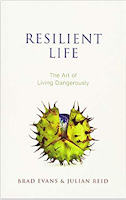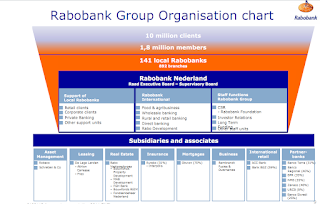Veerkrachtig leven (Brad Evens, Julian Reid)
 Resilient life, the art of living dangerously. Ik zag die titel en wilde toen direct het boek lezen. Hetgeen ik probeerde, maar de inhoud (gericht op politieke besluitvorming) en vorm (sterk academisch) viel me zeer zwaar.
Resilient life, the art of living dangerously. Ik zag die titel en wilde toen direct het boek lezen. Hetgeen ik probeerde, maar de inhoud (gericht op politieke besluitvorming) en vorm (sterk academisch) viel me zeer zwaar.Een typisch geval van stijlbreuk: de vorm en inhoud passen niet bij elkaar. De titel geeft een indicatie van een populair boek over veerkrachtig leven, maar de inhoud is academisch en gericht op een heel ander publiek. Beide schrijvers zijn wetenschappers, Brad Evens en Julian Reid.
Brad Evans is a political philosopher, critical theorist and writer, whose work specialises on the problem of violence. The author of some ten books and edited volumes, along with over fifty academic and media articles, he serves as Professor of Political Violence & Aesthetics at the University of Bath, UK. (Bron: Amazon)
Op dezelfde site staat ene korte samenvatting van hun stellingname:
What does it mean to live dangerously? This is not just a philosophical question or an ethical call to reflect upon our own individual recklessness. It is a deeply political issue, fundamental to the new doctrine of ‘resilience’ that is becoming a key term of art for governing planetary life in the 21st Century. No longer should we think in terms of evading the possibility of traumatic experiences. Catastrophic events, we are told, are not just inevitable but learning experiences from which we have to grow and prosper, collectively and individually. Vulnerability to threat, injury and loss has to be accepted as a reality of human existence.
What does it mean to live dangerously? This is not just a philosophical question or an ethical call to reflect upon our own individual recklessness. It is a deeply political issue, fundamental to the new doctrine of ‘resilience’ that is becoming a key term of art for governing planetary life in the 21st Century. No longer should we think in terms of evading the possibility of traumatic experiences. Catastrophic events, we are told, are not just inevitable but learning experiences from which we have to grow and prosper, collectively and individually. Vulnerability to threat, injury and loss has to be accepted as a reality of human existence.
... Resilience, they argue, is a neo–liberal deceit that works by disempowering endangered populations of autonomous agency. Its consequences represent a profound assault on the human subject whose meaning and sole purpose is reduced to survivability. Not only does this reveal the nihilistic qualities of a liberal project that is coming to terms with its political demise. All life now enters into lasting crises that are catastrophic unto the end.
Ik begrijp dit boek dus niet, het lezen van ellenlange academische zinnen kost me een energie die ik er niet voor over heb. Toch wilde ik weten wat de schrijvers precies tot doel hadden. Hebben ze een punt, en wat is hun stelling dan precies? Of pakken ze een populair thema - resilience - en zoeken ze wetenschappelijke argumenten om het fenomeen veerkracht in de huidige politiek te verklaren?
De essentie van het boek zit denk ik in hoofdstuk twee, insecure by design. De neoliberale politiek heeft "zekerheid" als economisch fundament verhandeld voor onzekerheid en verkoopt dat als nieuwe orde, waar de burgers mee moeten leren leven.
"Politiek," lees ik in de laatste sectie, "is de kunst van het transformeren van de wereld." Maar dan moet dat wel mogelijk zijn, men moet die transformatie wel kunnen creëren. Daarvoor is "poëtische" creativiteit nodig, zoals die van Samuel Beckett beschrijft in zijn (toneelstuk) endgame.
Aan het eind van het boek staat een uitgebreide lijst aan referenties. Bijna al deze referenties (de meeste als boeken) zijn terug te vinden op Amazon. In tegenstelling tot dit werk dat nauwelijks reviews heeft (twee weinig zinvolle vermeldingen), staan bij onderstaande werken bijna allemaal uitgebreide reviews. In die zin geeft dit boek aanleiding om verder te lezen.
- Agamben, Giorgio, Homer Sacer en The Kingdom and the glory.
- Bachelard, Gaston, The Psychoanalysis of fire
- Badiou, Alain, Infinite thought.
- Barnett, Thomas, Great Powers, America and the world after Bush
- Bauman, Zygmunt, Liquid fear, liquid times, collateral damage - social inequalitites in a global age.
- Beckett Samuel, Endgame
- Berlin Isaiah, two concepts of liberty
- Butler, Judith, Antigone's Claim
- Cooper, Melinda. Life as surplus. Biotech and capitalism in the neoliberal era
- De Landa, Manuel, 1000 years of non liniear history.
- Deleuze and Guattari, a thousand plateaus. Capitalism and schizofrenia.
- Edkins, Jenny, Trauma, Memory, Trauma and world politics: reflections on the relationship between past and present
- Foucault, Michel, the order of things. An archeology of human sciences. The birth of biopolitics.
- Hansen, James. Storms of my grandchildren. The truth about the coming climate catastrophe and our last chance to save humanity
- Holloway, John. Changing the world without taking power. The meaning of revolution today.
- Kay, Lily Who wrote the book of life?
- Klein, Naomi, the shock doctrine. The rise of disaster capitalism
- Krugman, Paul. the self organizing economy
- Levi, Primo. The drowned and the saved.
- Neiman, Susan. Evil in modern thought.
- Nietzsche, Friedrich, The will to power. Ecce Homo
- Rosenau, James. Citizinships in changing global order.
- Sloterdijk, Peter. Thinker on Stage. Nietzsche´s materialism. Spheres. Rages and time.
- Wang, Margaret. Educational resilience in inner cities
- Weisman, Alan. The world without us.
--
2018/07/donut-economie


Reacties